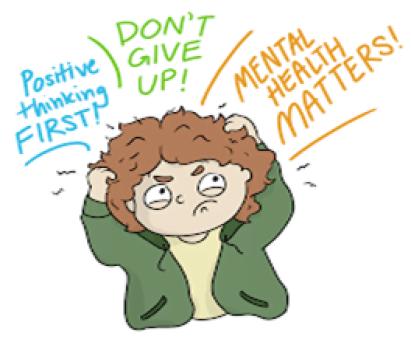Do you have stress? Are you suffering from Anxiety? These questions are very common nowadays. Stress and Anxiety are some common mental health conditions.
The World Health Organisation (WHO) revealed that 7.5 percent of the Indian population suffers from some form of mental disorder. Mental illnesses constitute one-sixth of all health-related disorders and India accounted for nearly 15% of the global mental, neurological, and substance abuse disorder burden. The treatment gap, which is defined as the prevalence of mental illnesses and the proportion of patients that get treatment, is over 70 percent. Only less than 4000 professionals are available to treat the patients.
Mental health pertains to the overall psychological, emotional, and social well-being of an individual, enabling them to confront daily stressors and live a contented life. It encompasses an individual’s thoughts, feelings, and behaviors, and can positively influence their ability to navigate challenging circumstances in their environment. Good mental health fosters resilience and equips individuals with the tools to overcome adversities and obstacles in a productive and fulfilling way.
Common Factors that can affect mental health:
-
Genetics: Certain mental health conditions such as depression, anxiety, and bipolar disorder can run in families. Genetic factors can also increase susceptibility to mental health issues.
-
Trauma: Experiencing physical, emotional, or sexual abuse, neglect, or other traumatic events can increase the risk of developing mental health conditions.
-
Substance abuse: Substance abuse can lead to changes in brain chemistry that can affect mental health.
-
Environmental factors: Environmental factors such as poverty, social isolation, and discrimination can contribute to the development of mental health conditions.
-
Chronic stress: Prolonged exposure to stress can lead to changes in brain chemistry that can affect mental health.
-
Physical health conditions: Chronic physical health conditions such as heart disease, diabetes, and cancer can have an impact on mental health.
-
Medications: Certain medications can have side effects that affect mental health.
-
Hormonal changes: Hormonal changes such as those that occur during pregnancy, menopause, and puberty can affect mental health.
-
Lack of sleep: Sleep deprivation can affect mental health, leading to problems with mood, concentration, and overall functioning.
It’s important to note that mental health is complex and can be influenced by many different factors, including those not listed above. Seeking professional help from a mental health provider can be helpful in managing and treating mental health issues.
Mental health can also be influenced by social support, and access to resources such as education, employment, and housing. It’s important to understand that mental health is not a static state, but rather a dynamic state that can change over time.
The warning signs of a mental illness:
-
Changes in mood: sudden mood swings, feeling persistently sad or irritable, having difficulty regulating emotions.
-
Changes in behavior: withdrawing from social activities, neglecting responsibilities, engaging in risky behaviors, changes in sleep or eating patterns.
-
Changes in thinking or perception: difficulty concentrating, feeling disconnected from reality, experiencing hallucinations or delusions, having obsessive or intrusive thoughts.
-
Physical symptoms: unexplained aches and pains, changes in appetite or weight, feeling lethargic or fatigued.
-
Changes in personality: changes in personality traits or behavior that are out of character.
-
Difficulty functioning: struggling to carry out daily activities such as getting out of bed, going to work or school, or maintaining relationships.
-
Substance abuse: increasing use of drugs or alcohol to cope with mental health symptoms.
It’s important to note that experiencing any of these symptoms does not necessarily mean that someone has a mental illness, but they may be a cause for concern and should be addressed. If you or someone you know is experiencing any of these symptoms, seeking professional help from a mental health provider is recommended.
Mental health diagnosis and treatment:
It is important for addressing mental health disorders and improving overall well-being. Here are some key points to consider:
1. Diagnosis: A mental health diagnosis is typically made by a qualified mental health professional, such as a psychiatrist or clinical psychologist. Diagnosis involves a thorough assessment of symptoms, medical history, and other factors that may contribute to mental health concerns.
2. Treatment: There are a variety of treatments available for mental health disorders, including therapy, medication, and self-care strategies. Treatment plans are typically tailored to the individual’s specific needs and may involve a combination of approaches.
3. Therapy: Therapy can be a highly effective treatment for many mental health disorders. There are many different types of therapy, including cognitive-behavioral therapy, psychodynamic therapy, and interpersonal therapy. Therapy can be done individually or in a group setting.
4. Medication: Medication can be used to help manage symptoms of certain mental health disorders, such as depression, anxiety, and bipolar disorder. Medication should be prescribed and monitored by a qualified medical professional.
5. Self-care: Self-care strategies, such as exercise, mindfulness, and stress reduction techniques, can be helpful in managing symptoms of mental health disorders and promoting overall well-being.
6. Support: Support from family, friends, and mental health professionals can be an important part of the treatment process. Support groups can also be a valuable resource for individuals with mental health concerns.
It Is Important to note that mental health is a complex issue and treatment plans may vary depending on the individual. If you or someone you know is struggling with mental health concerns, it is important to seek professional help. There are many resources available, including mental health professionals, support groups, and crisis hotlines. It’s important to remember that seeking help is a sign of strength, not weakness.
How to maintain positive mental health:
-
Staying positive
-
Eating healthy food
-
Keeping oneself active physically and mentally (exercise, yoga)
-
Being mindful
-
Maintain healthy relationships
-
Being content and grateful
-
Getting enough rest and sleep
-
Socialising with others
-
Practice gratitude
-
Developing coping skills
-
Asking for professional help if needed
“Dear Zindagi” (2016) is a popular Indian movie that tells the story of Kaira, a young woman struggling with emotional issues. Seeking guidance, she visits a therapist named Dr. Jehangir Khan. The film explores Kaira’s journey as she deals with anxiety, depression, and various personal challenges. Through its sensitive portrayal of mental health, “Dear Zindagi” highlights the importance of seeking help and promotes self-discovery and self-acceptance. The movie sparked conversations about mental health in India, destigmatizing the topic and encouraging open discussions about emotional well-being.
Conclusion:
Mental health is a crucial aspect of our overall well-being, yet it’s often neglected or overlooked. When we think of our health, we usually give priority and think of physical health, but never realize that mental health is just as important. Mental health affects how we think, feel, and behave, with varied individuals in different situations. It plays a critical role in our ability to cope with the challenges in our life.
Helping people to talk openly about their problems and their mental health issues, involvement of family and friends and their initiative to help the individuals in their families and neighbourhood to seek medical help, creating awareness and guiding individuals to seek counselling and proper treatment, mental health awareness programs and camps involving youth, involving social media and online apps to create awareness and to remove the social stigma are the key measures which can create a major difference.
It has been identified as an important issue that needs attention after COVID-19 and increased usage of the internet. Recently, the Government of India has come up with mental health programs and started collaborating with professional organizations to address them by developing appropriately trained professionals.
The increased and improved mental health acceptance in society will lead to reduced anxiety, improved moods, clearer thinking, a greater sense of inner peace, Increased self-esteem, reduced risk of depression, and improved relationships.
Let’s all pledge to promote mental health awareness and the importance of good mental health in our families, in our communities, and in our society.
S. Uma Maheswari
Psychological Counsellor and Cognitive Hypnotic Coach
************************








